Related Research Articles
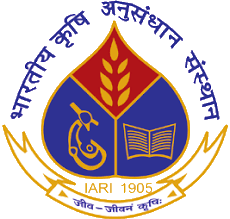
The Indian Agricultural Research Institute (IARI), commonly known as the Pusa Institute, is India's national institute for agricultural research, education and extension. The name Pusa Institute is derived from the fact that the institute was originally located in Pusa, Bihar as the Imperial Institute of Agricultural Research in 1911. It was then renamed as the Imperial Agricultural Research Institute in 1919 and following a major earthquake in Pusa, it was relocated to Delhi in 1936. The current institute in Delhi is financed and administered by the Indian Council of Agricultural Research (ICAR). The IARI was responsible for the research leading to the "Green Revolution in India" of the 1970s.
The Indian Council of Social Science Research (ICSSR) is the national body overseeing research in the social sciences in India. It was established in New Delhi in 1969.

Delhi University (DU), formally the University of Delhi, is a collegiate central university located in New Delhi, India. It was founded in 1922 by an Act of the Central Legislative Assembly and is recognized as an Institute of Eminence (IoE) by the University Grants Commission (UGC). As a collegiate university, its main functions are divided between the academic departments of the university and constituent colleges. Consisting of three colleges, two faculties, and 750 students at its founding, the University of Delhi has since become India's largest institution of higher learning and among the largest in the world. The university has 16 faculties and 86 departments distributed across its North and South campuses. It has 77 constituent colleges and five other institutes. The Vice President of India serves as the university chancellor.

Jawaharlal Nehru University (JNU) is a public major research university located in New Delhi, India. It was established in 1969 and named after Jawaharlal Nehru, India's first Prime Minister. The university is known for leading faculties and research emphasis on social sciences and applied sciences.
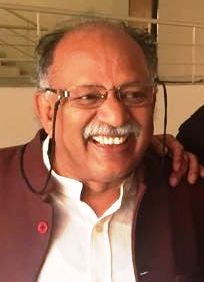
Deepak Kumar is a professor of History of Science and Education, at Jawaharlal Nehru University, New Delhi, India. Kumar has lectured at numerous universities within India and abroad, has held visiting fellowships at the universities of Cambridge, London, Leiden, The Smithsonian Institution, etc. and has also taught at Wisconsin University, Madison, USA, and York University in Toronto, Canada.
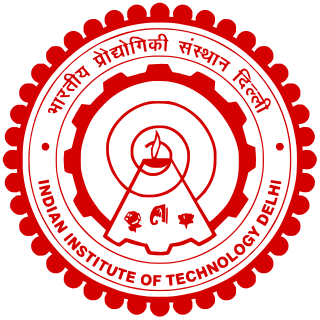
Indian Institute of Technology Delhi is an autonomous globally acclaimed public research and engineering institute located in Hauz Khas in South Delhi, Delhi, India. It is one of the oldest Indian Institutes of Technology in India.

The Ministry of Science and Technology is the Indian government ministry charged with formulation and administration of the rules and regulations and laws relating to science and technology in India.

The Ministry of Education is a ministry of the Government of India, responsible for the implementation of the National Policy on Education. The Ministry is further divided into two departments: the Department of School Education and Literacy, which deals with primary, secondary and higher secondary education, adult education and literacy, and the Department of Higher Education, which deals with university level education, technical education, scholarships, etc.
Sudhir Kumar Sopory is an Indian educationist, plant physiologist, scientist and former vice chancellor of Jawaharlal Nehru University, New Delhi. He is known to be the first to purify a protein kinase C activity from plants and is credited with the identification of topoisomerase as a substrate of protein kinase C. He is an elected Fellow of several major Indian science academies and The World Academy of Sciences (TWAS) and is a recipient of many honours, including the 1987 Shanti Swarup Bhatangar Prize, the highest Indian award in the science and technology categories. The Government of India awarded him the fourth highest civilian honour of the Padma Shri, in 2007, for his contributions to science and technology.
Science and technology studies (STS) in India is a fast growing field of academic inquiry in India since the 1980s. STS has developed in the country from the science movements of the 1970s and 1980s as well as the scholarly criticism of science and technology policies of the Indian state. Now the field is established with at least five generations of scholars and several departments and institutes specialising in science, technology and innovation policy studies.

V. R. Panchamukhi, is an Indian Economist and Sanskrit scholar. He was born on September 17, 1936, in Dharwad, Karnataka. He is the eldest son of Vidyaratna Shri R. S. Panchamukhi, an archaeologist and indologist and Sanskrit Scholar.
Alok Bhattacharya is an Indian parasitologist, academic and a professor at the School of Life Sciences of the Jawaharlal Nehru University. He chairs the Biotechnology Information System Network (BITSNET) as well as the Life Sciences Expert Committee of FIST program of the Department of Science and Technology (DST). He is an elected fellow of the Indian Academy of Sciences and the Indian National Science Academy and is known for his studies on Entamoeba histolytica and species-specific calcium binding protein and its gene.
Suman Kumar Dhar is an Indian molecular biologist and a professor at the Special Centre for Molecular Medicine of Jawaharlal Nehru University. He is known for his studies on the DNA replication and cell cycle regulation in Helicobacter pylori and Plasmodium falciparum, two pathogens affecting humans. An elected fellow of the National Academy of Sciences, India, Indian National Science Academy and the Indian Academy of Sciences, he is also a recipient of the National Bioscience Award for Career Development of the Department of Biotechnology in 2010. The Council of Scientific and Industrial Research, the apex agency of the Government of India for scientific research, awarded him the Shanti Swarup Bhatnagar Prize for Science and Technology, one of the highest Indian science awards, in 2012, for his contributions to biological sciences.
Deepak Gaur was an Indian molecular biologist, and a professor at the School of Biotechnology of Jawaharlal Nehru University. Known for his studies on Plasmodium falciparum, Gaur is a recipient of the N-Bios Prize. The Council of Scientific and Industrial Research, the apex agency of the Government of India for scientific research, awarded him the Shanti Swarup Bhatnagar Prize for Science and Technology, one of the highest Indian science awards, for his contributions to medical sciences in 2017.
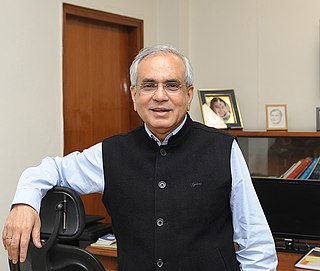
Rajiv Kumar is an Indian economist who had served as the second vice-chairman of the NITI Aayog. He also serves as the Chancellor of Gokhale Institute of Politics and Economics, Pune His earlier stint in Government was initially with the Ministry of Industry and subsequently in the Ministry of Finance, as Economic Advisor during the reform years of 1991-1994. He has wide experience of having worked in government, academia, industry associations, as well as in international financial institutions. He also served as an independent director on the Central Boards of the Reserve Bank of India and the State Bank of India.
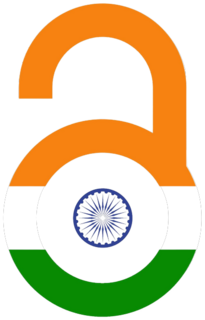
Open access in India was begun in May 2004, when two workshops were organized by the M S Swaminathan Research Foundation, Chennai. This laid the foundation for the Open Access movement in India. In 2006, the National Knowledge Commission in its recommendations proposed that "access to knowledge is the most fundamental way of increasing the opportunities and reach of individuals and groups". In 2009, the Council of Scientific & Industrial Research (CSIR) began requiring that its grantees provide open access to funded research. In 2011, the Open Access India forum formulated a draft policy on Open Access for India. Currently, the Directory of Open Access Journals lists 326 open access journals published in India, of which 233 have no fees.
Seema Bhatnagar is an Indian scientist, working in the field of anticancer drug discovery. She primarily works on synthetic chemistry approaches for targeted delivery of anticancer drugs in breast cancer.
The National Education Policy of India 2020, which was started by the Union Cabinet of India on 29 July 2020, outlines the vision of new education system of India. The new policy replaces the previous National Policy on Education, 1986. The policy is a comprehensive framework for elementary education to higher education as well as vocational training in both rural and urban India. The policy aims to transform India's education system by 2030.
References
- ↑ "CSSP". www.jnu.ac.in. Retrieved 2019-06-27.
- ↑ Pulparampil, John (6 November 2017). The Mirror of My Self: A New Reading of My Autobiography "Gospel According to Myself". Educreation Publishing.
- ↑ Sen, Nirupa (25 June 2001). "News: Revival of the Centre for Studies in Science Policy at Jawaharlal Nehru University, New Delhi" (PDF). Current Science . 80 (12): 1479–1480. Retrieved 2019-06-27.
- ↑ James, G. McGann (2018). 2018 Global Go To Think Tank Index Report. USA: University of Pennsylvania. p. 151.
- ↑ "Third Annual Christopher Freeman Memorial Lecture 2017 CSSP JNU.JPG | TCLab". tc-lab.org. Retrieved 2019-07-03.
- ↑ "Prof. Madhav Govind".
- ↑ "Saradindu Bhaduri". www.jnu.ac.in. Retrieved 2019-06-27.
- ↑ "New Prince Claus Chair appointment on 'Frugal Innovation for Development and Equity'". iss.nl. International Institute of Social Studies. 7 September 2015. Archived from the original on 2015-09-22. Retrieved 2019-07-03.
- ↑ "Dr. Rajbeer Singh".
- ↑ "Dr. Reeta Sony".
- ↑ "Dr. Anamika Gulati".
- ↑ "Dr. Anup Kumar Das".
- ↑ "Prof. V.V. Krishna".
- ↑ "Prof. Pranav N. Desai".
- ↑ "Prof. Sujit Bhattacharya".
- ↑ "Prof. Ashok Parthasarathi".
- ↑ "Prof. K.J. Joseph".
- ↑ "Dr. Rohan D'Souza" (PDF).
- ↑ "Dinesh Abrol".
- ↑ "Prof. Mammo Muchie" (PDF).
- ↑ "Dr. Mathieu Quet".
- ↑ "Prof. GS Bhalla" (PDF).
- ↑ "Prof. Sivatosh Mookerjee".
- ↑ "Dr. Nasir Tyabji".
- ↑ "CSSP Students". www.jnu.ac.in. Retrieved 2019-06-28.
- ↑ "NSTMIS, Department of Science and Technology" . Retrieved 2019-06-28.
- ↑ "Who's Who | Welcome to Munger District | India" . Retrieved 2019-06-28.
- ↑ Das, Anup Kumar (2019-02-25). "Research Blog | Centre for Studies in Science Policy: Marie Skłodowska Curie Post-doctoral Fellowship is Awarded to Dr. Anwesha Borthakur of CSSP, JNU". Research Blog | Centre for Studies in Science Policy. Retrieved 2019-07-13.
- ↑ "Indian School of Business |Hyderbabad". www.isb.edu/. Retrieved 2022-08-29.